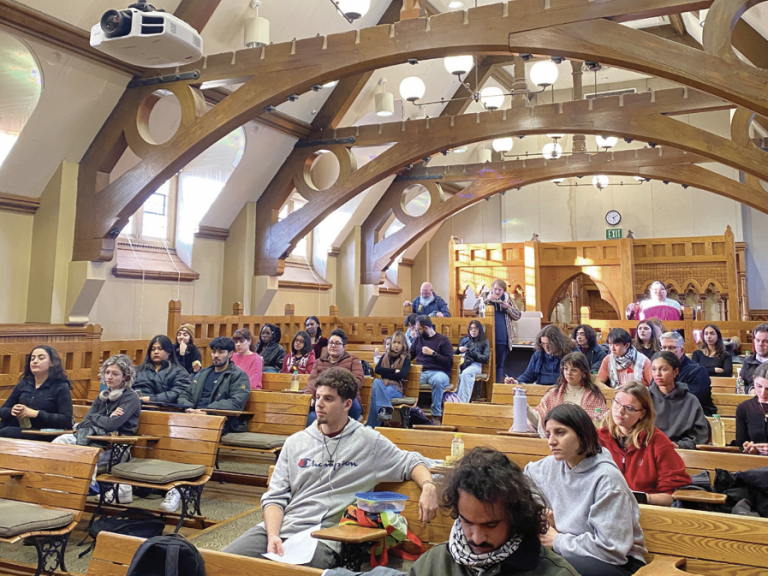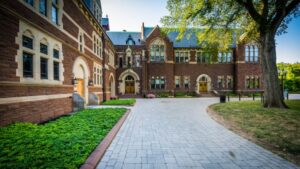Jack P. Carroll ’24
News Editor
President of the College Joanne Berger-Sweeney provided an update on Trinity’s progress towards its Summit strategic plan goals in an email addressed to students, faculty, and staff on Wednesday, Mar. 10. The Bicentennial Strategic Planning Commission developed the strategic goals in Oct. 2016 in preparation for Trinity’s bicentennial in 2023. The strategic goals include the following list of initiatives: (1) being a relevant, top choice college for students, faculty, and staff; (2) connecting our inclusive community even more deeply with Hartford and the world; (3) creating a financially and environmentally sustainable future.
As previously reported in the Tripod, the Bicentennial Strategic Planning Commission (BSPC) was created to “guide plans in several areas of the College as we approach and enter into our third century.” The BSPC consists of a Steering Committee and five subcommittees that aim to improve Trinity’s operations in the following areas: “Partnering with Hartford, A Global College, Learning and Skill Development Inside and Outside of the Classroom, Resources and Facilities, and Environmental Sustainability.”
In the email, Berger-Sweeney wrote that over recent years the College has “initiated new directions and programs; fostered inclusion; designed a distinctive, relevant undergraduate curriculum; and made needed improvements in operations and facilities.”
A report attached to the email outlined the steps that Trinity has taken to meet its strategic plans from Oct. 2017 to Feb. 2021. Among the list of efforts to make Trinity a top-choice school, the report highlighted that first-year retention has grown to over 90 percent, the number of internships have increased by 13 percent via the Bantam Career Network; as well as that Trinity has adopted the “Liberal Arts Plus Curriculum” which includes new co-curricular credits, experiential certificates, and a wellness requirement for launch in fall 2021.
In September, the Tripod reported that the U.S. News and World Report rankings for 2021 place Trinity at #44 among National Liberal Arts Colleges, an increase of two from last year’s #46. In an email to alumni, Vice President for College Advancement Michael Casey wrote that Trinity’s increase in rank “was driven by steady improvements in a number of categories” including “graduate rate performance,” “social mobility,” “alumni giving,” and “financial resources.”
In addition, The Wall Street Journal/Times Higher Education (WSJ/THE) College rankings for 2021 ranked Trinity at #92 among almost 800 universities nationwide. Unlike the U.S. News and World Report, the WSJ/THE does not distinguish between “National Liberal Arts Colleges” and “National Universities.”
Regarding the College’s efforts to integrate Trinity within Hartford and the world, the report listed the creation of the Center for Hartford Engagement and Research which includes the Liberal Arts Action Lab and the Public Humanities Collaborative. In addition, the report noted that Trinity designed a new Innovation Center downtown, funded by a $2.5M grant; implemented a “home tuition” model for global study, extending financial aid; and was named a top producer of U.S. Fulbright Students and Scholars among a longer list of milestones.
To fulfill the goal of creating a more financially sustainable future, the report noted that Trinity has secured $194M in gifts and pledges, including a 25 percent increase in current-use dollars in FY20; refinanced $59M debt, saving $1M annually; and added 500 new donors, 300 new fundraising volunteers, and 200 new class agents. With regard to the environment, the College has installed fuel cell and solar panels, with savings; created a position of full-time sustainability coordinator with a multi-constituent committee; and initiated curricular movement to climate change, with faculty support.
Earlier this month, the Tripod reported that the Climate Emergency Committee outlined a list of climate studies proposals in an email addressed to members of the faculty. These proposals include new general education distribution requirements, an interdisciplinary minor, a Gateway program, and experiential certificates in climate change. Professor of Religion in Public Life Mark Silk, who chairs the committee, informed the Tripod that these course options will be presented to members of the faculty on Apr. 20. Silk hopes that the faculty votes on a motion to keep the committee in operation for an additional year so that the committee can encourage departments to develop certificate programs as well as search for money to fund course development.
Chief of Staff and Associate Vice President Jason Rojas told the Tripod Monday that the “implementation of some goals may extend beyond the Bicentennial.” In addition, Rojas indicated that students will “continuously have the opportunity to provide input on the plan by providing feedback to faculty and staff responsible for implementing the components of the plan that directly involve students.” After the Bicentennial, Rojas indicated that “faculty, staff, students, the Board of Trustees as well as alumni in the future will play a role in evaluating our progress on existing plans while working together to develop new ones.”







+ There are no comments
Add yours